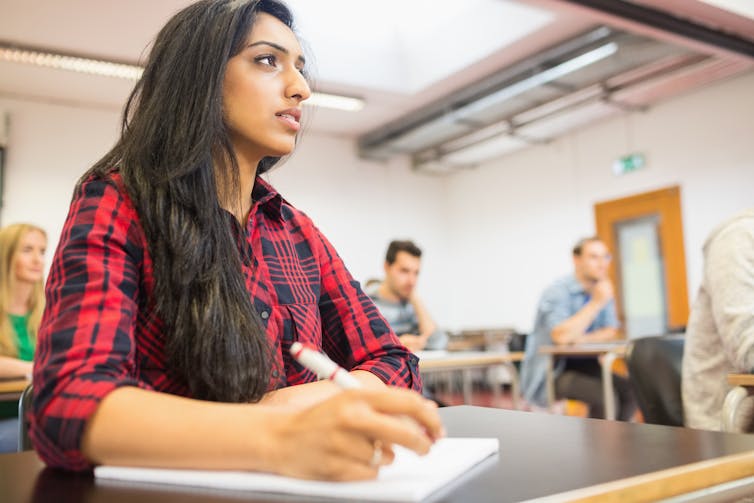
International students are a hugely important part of Australia’s university system and its economy. In 2019, before COVID, international education was worth about A$40.3 billion to the Australian economy.
As of 2022, international students are worth about $25.5 billion but this figure is expected to rise again. Not only has Australia reopened its borders, but it is trying to entice international students by increasing post-study working rights and working rights on student visas.
China is of huge importance to our international student intake, making up 25% of the group as of December 2022. However, students from South Asia – including India – are also important, making up more than 30% of those studying here.
We know South Asian students are extremely keen to work here. Indian graduates were granted the most post-work study visas in the two years leading up to the pandemic. But as of 2022, only 57% of undergraduate Indian students and less than 53% of postgraduates had full-time employment after they graduated.
Our new study talked to South Asian graduates about the support they got trying to find a job. It found they face two main challenges: both career fairs and careers support on Australian campuses are skewed towards domestic students.
Our research
As of December 2022, about 16% of international students in Australia come from India, with a further 9% coming from Nepal. More than 7% of students also come from a combination of Pakistan, Sri Lanka, Bangladesh, Bhutan, Afghanistan and the Maldives.
We know that many of these students want to study in Australia so as to get a job here and then gain either permanent residency or citizenship. They are often referred to as “two-step” migrants.
Our study wanted to look at what kind of support this group was receiving around employability - the skills and opportunities needed to find a job. In 2020 we interviewed 20 South Asian graduates to understand their experiences at careers fairs and university career services, as these are the two major vehicles for supporting students to get into jobs.
The graduates were mainly in Melbourne and studied a range of degrees, including business, accounting, finance, engineering, education and public health.

Careers fairs are set up for domestic students
Australian universities invite companies to career fairs on campus to show students what job opportunities are out there and to connect them with prospective employers.
The South Asian graduates we interviewed were disappointed with the fairs. Most of the companies they met had internships, work placements or full-time graduate opportunities but they were largely for domestic students.
As one interviewee seeking a job in business told us:
We did have career fairs at university every semester. But most of the career fairs I attended just have jobs for PRs [permanent residents] or citizens. TR [temporary resident] jobs are very limited. Maybe just two or three companies only at the fair takes in international students or TRs.
Another interviewee, who studied telecommunications also talked of limited opportunities:
Very few companies are open for international students – probably less than ten. So, it is very hard. We don’t have much opportunities due the limited numbers of companies that take in international graduates.
Careers office don’t help enough
Most Australian universities have a career office or career advice service. Careers office offers offer general services around resume checking and tips for interview skills.
The South Asian graduates went to careers offices for help but again, found the advice and resume assistance was geared at domestic students. As another interviewee seeking work in planning told us:
Career advice provided by the university careers office is very generic. It is not going to help or be relevant, as it is supposed to be different for international students who are finding employment in Australia. So, I did not take the advice that they gave me. I got better advice from industry professionals who were also academics at this university.
An engineering graduate who had only found work in a supermarket said he went to the career office several times to try and get his resume “sorted out”.
But they just enrol me for the resume sessions every time I ask for feedback on my resume. I waste my whole day for this. They gave the same tips every time to everyone. So not much help was provided to me. I am still [searching for] jobs in my field of studies, which is engineering.
What do we need to do instead?
Australian universities need to move away from a “once-size-fits-all” approach when it comes to employability support. Some key changes could include:
initiating partnerships with companies or industry representatives to provide specific job opportunities to international students via internships, work placements and volunteering roles
inviting more companies to career fairs that will be open to offering opportunities for international students or graduates on temporary visas
inviting international graduate alumni as guest speakers to career sessions, to mentor students, help modify their resumes and locate work or internship opportunities
providing careers offices with the capacity to provide practical career planning and development guidance for international students. This is so international students are able to visualise their careers in Australia, in their home country or a third country.
Australia’s economy and university system rely heavily on international graduates to come and study here. They do so on the premise it will help their career prospects, and Australian universities need to do more to live up to this.
The authors do not work for, consult, own shares in or receive funding from any company or organisation that would benefit from this article, and have disclosed no relevant affiliations beyond their academic appointment.
This article was originally published on The Conversation. Read the original article.







